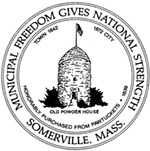 Energy-efficient LED lightbulbs in street, decorative and city building external lights would save estimated $450,000 annually, reduce CO2 emissions by 600 metric tons per year
Energy-efficient LED lightbulbs in street, decorative and city building external lights would save estimated $450,000 annually, reduce CO2 emissions by 600 metric tons per year
A funding request that would allow the conversion of every City of Somerville-owned streetlight and other light fixtures to energy-efficient LED lightbulbs—which would pay for itself in cost savings within five years and advance the city’s goal of becoming carbon neutral by 2050—is currently before the Board of Aldermen for review.
The funding request recommended for approval by the aldermen’s Finance Committee on May 27 is for $2,475,000, and will now go before the full Board for approval. After a $619,000 rebate from Eversource for installing LED lights, the net cost of changing all city-owned lights including streetlights, decorative lights and external lights on public buildings would total an estimated $1,486,585. Once the conversion from the existing sodium lightbulbs to LED lightbulbs is complete, which would take up to a year, the city would save a projected $450,000 annually in energy costs. Also, by switching to all LED lights, the city would reduce its carbon dioxide emissions by approximately 600 metric tons per year.
“This is a commonsense step the city can take that’s better for both our residents’ wallets and the environment,” said Mayor Joseph A. Curtatone. “In addition to those benefits, the quality of light from LED lightbulbs is superior to sodium lightbulbs and because of their design we’ll have better directional control over our lights, so that our streetlights are focused on illuminating our public ways instead of bleeding into residents’ homes or the night sky. It improves our residents’ quality of life and our public safety, too.”
Residents can see LED streetlights currently being piloted along Putnam Street, on Highland Avenue from School Street to Walnut Street, and on Pearl Street between McGrath Highway and Cross Street. East Broadway streetlights also already used LED lightbulbs. The piloted lights range from 42 watts up to 93 watts so that the city can evaluate the light output and ensure that the proper wattage lights are chosen for residential streets, busier collector roads and main arterial roadways, striking a balance between public safety, energy savings and potential impact on homes.
As the city pursues a more environmentally friendly and cost-effective approach to lighting through LED lights, it continues to explore other lighting alternatives, too. Through a grant from the Massachusetts Clean Energy Center’s InnovateMass program, SolarOne is currently testing solar-powered LED lights on the Community Path, having installed seven new lights and connected the solar-powered system to 16 existing lights. As part of its new Somerville GreenTech Program, the city will host additional green tech pilot projects that use innovative approaches to addressing climate change, and could potentially apply for funding for piloting future projects through the MassInnovate program.
“The conversion to LED lights is an exciting step toward reducing our carbon emissions because it has an immediate impact,” said Oliver Sellers-Garcia, the city’s Director of Environment and Sustainability. “No amount of preparedness can help us withstand the projected changes in our climate if we continue business-as-usual, so while we are working on building up our resiliency to climate change, we must also act today on reducing our contribution to the problem and avoid those worst case projections of tomorrow. Converting to LED lights is another step toward mitigating our contributions to climate change.”
— City of Somerville















Reader Comments